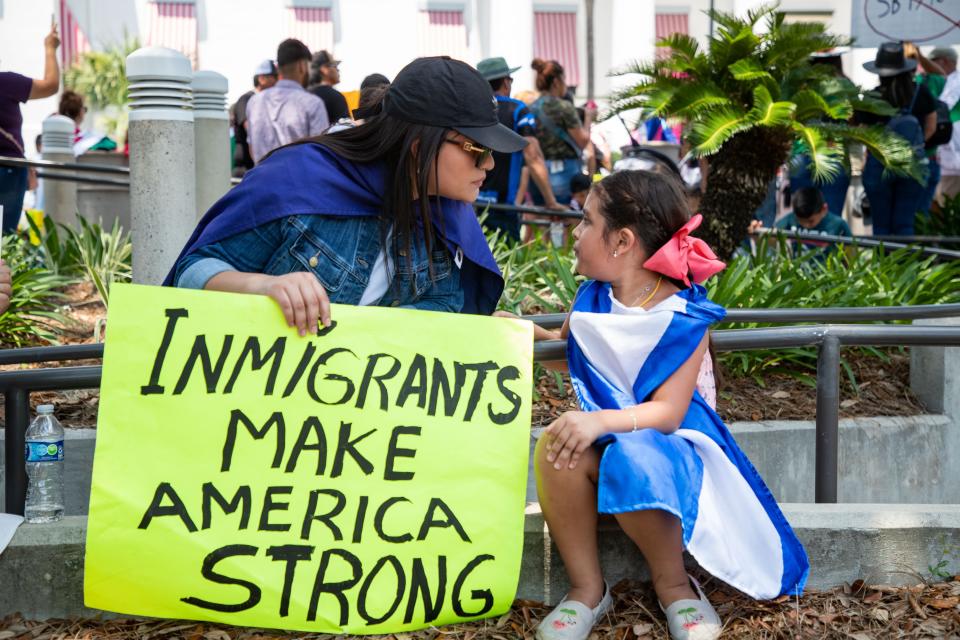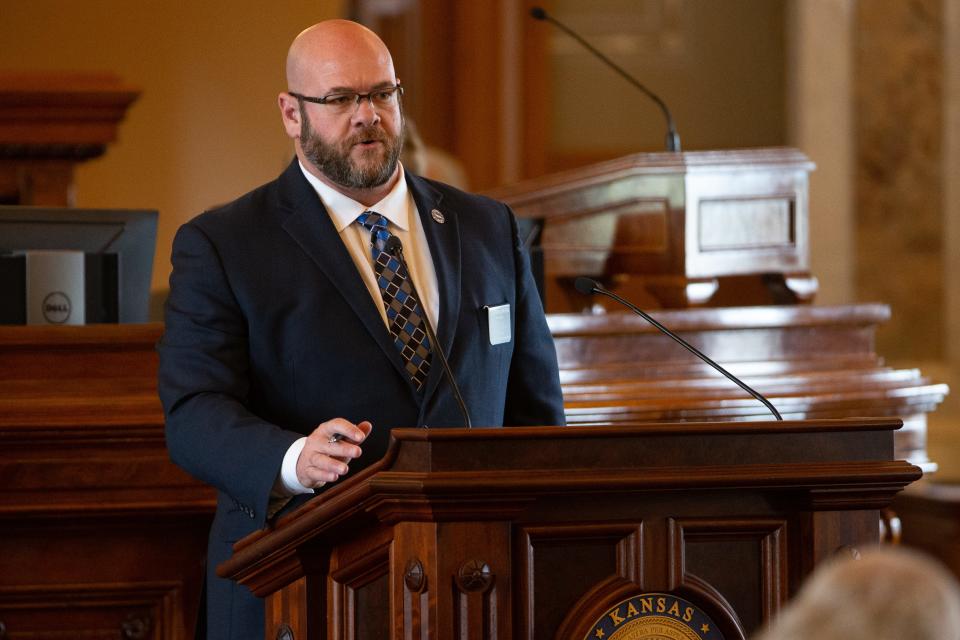Kansas targets human smuggling as advocates worry about unintended consequences
- Oops!Something went wrong.Please try again later.
Kansas legislators are acknowledging they may need to clarify a law enacted earlier this year that criminalizes human smuggling — and also raised concerns that it could be used to target undocumented immigrants and those who help support them.
Law enforcement and legislators who supported the bill have maintained that it will only be used to target those who knowingly transport or harbor individuals to possibly exploit them.
The law was initially one that attracted little attention, brought by two Franklin County lawmakers, both Republicans, who say they were approached about the issue by their county sheriff.
But in the waning days of the legislative session, as the law was passed and, ultimately, enacted over the veto of Gov. Laura Kelly, some expressed serious reservations about the impact it might ultimately have.
Concern among the state's Hispanic and immigrant community about the impact on undocumented immigrants — and implications for family, friends or community groups that might help them with day-to-day tasks — have continued even after the law took effect on July 1.

Carla Rivas-D'Amico, executive director of the Kansas Hispanic and Latino American Affairs Commission, said she has encountered that fear firsthand as her agency has conducted informational sessions across the state.
"I think in terms of what we've been seeing in the community is just fear," Rivas-D'Amico said. "People are terrified. People are canceling their doctor's appointments. People are moving out of the state — we've heard a lot of reports of that in southwest Kansas and communities like Liberal, for example."
What does Kansas' human smuggling law entail?
Law enforcement have attempted to tamp down concerns about the law, which creates the new crimes of "human smuggling" and "aggravated human smuggling."
In order to meet the definition of human smuggling in House Bill 2350, three criteria must be met:
A person knows, or should have known, that the individual they are dealing with entered into or remains in the United States illegally.
That person benefits financially or receives anything of value.
They know, or should have known, that the individual being smuggled is likely to be exploited for the financial gain of another person.
In her veto message, Kelly raised fears the law could be used to prosecute an individual who gets gas money in exchange for giving someone a ride to work or a paramedic transporting a person to the emergency room.
"I agree immigration issues need to be addressed, but this bill will have unintended consequences, from decimating our agriculture workforce to allowing the state to encroach into Kansans' personal lives," Kelly wrote.
The law also has raised concerns about racial profiling, with the Consulate of Mexico in Kansas City opposing the law ahead of its effective date, arguing it "can lead to racial profiling and acts of discrimination and abuses against the Hispanic, Latino and Mexican community."
Steve Martinez, an undersheriff with the Finney County Sheriff's Office, said it was not the policy of his department to check the immigration status of individuals they interact with, noting the department leaves those matters to federal immigration officials.
He noted law enforcement in his county wouldn't be arresting people in the situations the governor described.
"When we're talking about a smuggler, we're talking about a gang. We're talking about someone who is part of organized crime. This is a way they make a living by doing this," Martinez said at a forum held in Garden City last week on the issue. "We're not talking about the friends or the relatives who are giving somebody a ride in a car."
In Topeka, the Shawnee County Sheriff's Office said they have yet to apply the law. But spokesperson Abigail Christian said the agency "cannot speculate or provide an advisory opinion as to any particular circumstances where enforcement of this new law could occur."
Speaking at a press conference last month on HB 2350, Sedgwick County Sheriff Jeff Easter said the need for the bill came about because certain instances of human smuggling, such as financial exploitation, may not be covered under existing state law.
“That's not kidnapping," Easter said. "That's the problem. Sex trafficking is mainly toward juveniles. So, there was a gap. And I think the intent of this law was to fill that gap for individuals that are being victimized that are coming here."
What are the concerns about Kansas' human smuggling law?
But the vagueness of the law has created the possibility it could be interpreted quite differently depending on where you are in the state, said Monica Vargas-Huertas, chief commissioner of the Kansas Hispanic and Latino American Affairs Commission.
The day-to-day encounters for Hispanic and Latino Kansans with law enforcement already vary widely across the state, Vargas-Huertas said.
In some counties, for instance, she said there have been reports where passengers in a stopped vehicle have been required to provide identification, something that is not allowed unless an officer has a reasonable suspicion they have committed a crime.
"We may have police departments saying one thing, and in the county, they might be applying a different procedure," Vargas-Huertas said. "And it's very difficult for people to know where you are crossing the borders of one county to another one."
It is unknown whether Kansas Attorney General Kris Kobach has provided any guidance to law enforcement and prosecutors on how the statute might be interpreted, though advocates said clear, statewide guidelines from his office would help. Kobach's office didn't respond to a request for comment.
Proponents of the bill have pointed to the third prong of the law, which requires knowledge an individual is likely to be exploited for financial gain, as evidence that it will not pull in Good Samaritans or family members, especially those who live in households where some individuals are legal residents of the U.S. and others are not.
But there are concerns that even the phrasing of this part of the law is not adequately clear. A person does not have to be exploited to meet the definition of the bill, only that they are likely to be. And there is no requirement that a person's transport be related to their possible exploitation.
"That's a big gray area for interpretation," Vargas-Huertas said.
There are also other legal issues with how the law is drafted, said Emily Brandt, an assistant appellate defender for the Kansas State Board of Indigents' Defense and serves on its legislative committee, which opposed the original bill.
Immigration enforcement is the domain of the federal government, Brandt said, and there is nothing in state law that defines what it means to be in the country without authorization. Traditionally, efforts by states to wade into immigration issues have been exposed to arguments that they impose on the federal government's turf.
In 2014, a federal court struck down a more expansive Arizona law that made it "unlawful for a person to intentionally engage in the smuggling of human beings for profit or commercial purpose" on the grounds that it was pre-empted by federal immigration law.
Kobach's office initially sought a definition of human smuggling that mirrors what is included in federal law and would allow state law enforcement and prosecutors to communicate with federal immigration authorities about whether a person resides in the United States illegally.
The Legislature ultimately opted to remove that provision, with concerns it would give Kobach, an immigration hardliner, too much prosecutorial power.
Brandt noted this dynamic also could make it difficult to prosecute individuals under the law. While the first part of the law requires proving a person is undocumented, she said there is little incentive for a victim to come forward, work with law enforcement and possibly testify publicly if it could lead to their deportation.
"There's a serious problem there with protecting the rights of these vulnerable populations," she said.
Will legislators opt to revise Kansas' HB 2350?
But law enforcement is able to ascertain whether a crime victim is in the United States without authorization, said Rep. Stephen Owens, R-Hesston, chair of the House Corrections and Juvenile Justice Committee.
Owens said the law had become caught up in the national debate over immigration issues and a wider ranging Florida law that criminalizes transporting an undocumented immigrant to the state, among other provisions. While a federal crime of human smuggling also exists, he believed similar language in state law was also important.

"For the state to be able to have that mechanism, we all believed was a very important piece of ensuring accountability on behalf of those smuggled," Owens said.
Rep. Bill Clifford, R-Garden City, bemoaned the politicization of the issue, blaming Kelly's veto message for prompting "disinformation" and a wave of anxiety on social media.
But he also said he would work with another lawmaker from the Garden City area, Rep. Bob Lewis, to clarify the law next legislative session.
"I do think there needs to be discussion in the next session so that everyone understands the intent of the Legislature," Clifford said.
Changing the law, Owens believes, is not necessary at the moment — but he also didn't rule it out.
"As a chairman of that committee, I would be open to that as long as there's evidence to support the need for that change, right?" Owens said. "I'm not so prideful to think that this is a perfect law that doesn't need to change in any way."
But some believe the only path to redeeming the law is to scrap it entirely, though that option appears unlikely.
If lawmakers do elect to change course, Vargas-Huertas said, they should consult with immigrants and the groups who support them to ensure there is a final product that achieves its stated purposes — and doesn't target immigrant communities in Kansas.
"As soon as you explain exactly what is written in the bill ... anybody that works with immigrants understands the danger," she said. "So, if they want to really work on something, I hope that they would be calling advocates for the immigrant community who can help them to have a full perspective of the consequences of this bill."
This article originally appeared on Topeka Capital-Journal: Kansas human smuggling law concerns immigrant, Hispanic communities

